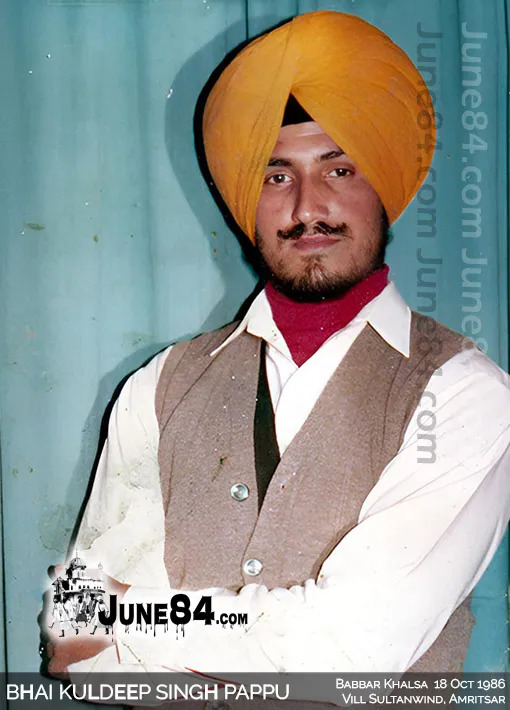Bhai Kuldeep Singh Babbar, remembered by many as Pappu Babbar, lived a short yet extraordinary life defined by courage, devotion, and an unshakable belief in the Sikh cause. His unwavering resolve during Punjab’s turbulent years has made him a symbol of resistance, inspiring generations to stand for truth and justice.
Early Life and Values
Born in the peaceful village of Sultanwind near Amritsar, Pappu Babbar was raised in a deeply religious Sikh farming family. From a young age, he absorbed the values of hard work, humility, and service to others. These principles shaped both his character and his future path.
He attended Dashmesh Model School before moving on to Guru Ram Das High School. Outside school hours, he was always ready to lend a hand on the family farm. This simple rural upbringing instilled discipline, responsibility, and a strong connection to his faith—qualities that later defined his role in the Sikh struggle.
Turning Toward the Sikh Struggle
The early 1980s brought unrest to Punjab, as political tensions and violence deeply impacted the Sikh community. Operation Blue Star and other acts of state repression created a climate of fear and injustice. For Pappu Babbar, this was not something to observe passively—he felt a personal duty to defend his community’s dignity and rights.
Motivated by these events, he became part of Babbar Khalsa, a Sikh organization committed to safeguarding the Panth. Under the guidance of leaders like Jathedar Sukhdev Singh Babbar, Pappu quickly earned a reputation for his discipline, reliability, and fearless dedication. His cousin, Harpal Singh Pappu, also served alongside him, adding a family bond to the shared mission.
Dedicated Service in Babbar Khalsa
Within Babbar Khalsa, Pappu Babbar took part in operations intended to protect the Sikh community from targeted violence. His comrades saw him as both strategic and brave—someone who could be trusted with the most challenging assignments.
He worked closely with prominent figures such as Talwinder Singh Babbar, contributing not just manpower but also a level-headed approach to planning. Guided by his faith, he saw every action as part of a larger duty to defend Sikh values and ensure justice for those wronged.
Arrest and Final Sacrifice
On 8 October 1986, Pappu Babbar was arrested by the Firozpur Police. For ten days, he was kept in custody, during which time he is believed to have endured severe mistreatment.
On 18 October 1986, he was killed in what is widely regarded by the community as a fake police encounter near the Indo-Pak border at Mamdot, Firozpur. He was only 24 years old. His death reflected the harsh reality of the time—when justice was often replaced by targeted elimination of Sikh activists.
His passing brought immense grief to his family, fellow Sikhs, and his comrades. But it also strengthened the resolve of many within the movement, reminding them of the sacrifices required in the pursuit of freedom and dignity.
A Lasting Mark on Sikh History
Though his life was short, Kuldeep Singh Babbar’s impact was profound. His dedication and martyrdom have become an integral part of the Sikh resistance story. Even decades later, his name evokes respect and admiration, representing the spirit of a generation that refused to be silenced.
He remains a symbol of what it means to live with purpose, to serve without fear, and to face oppression head-on, regardless of the personal cost.
Principles That Still Resonate
Pappu Babbar’s life carries lessons that remain relevant for all who value integrity:
-
Faith as a Shield – His deep spiritual roots gave him the courage to face extreme adversity.
-
Service Over Self-Interest – Every choice he made prioritized the needs of his people.
-
Standing Against Tyranny – He refused to back down in the face of injustice, even when the risks were life-threatening.
These are not just historical values—they are guiding lights for anyone who seeks to live with honor today.
Meaning for the Present Generation
For young Sikhs and others across the world, the story of Pappu Babbar offers more than historical interest—it provides a model of integrity and determination. His life challenges modern readers to think beyond personal comfort and to embrace the courage needed to defend what is right.
In an era when ideals are often compromised for convenience, his example stands as a reminder that lasting change comes from unwavering conviction.
Keeping His Memory Alive
Preserving Pappu Babbar’s story is vital to keeping the Sikh struggle’s history alive. Educational programs, commemorations, and community events can pass his legacy to new generations. Groups like June84 have worked to record and share these histories, ensuring that sacrifices like his are never forgotten.
Through remembrance, his courage continues to inspire activism and unity within the Sikh community and beyond.
Inspiration That Transcends Time
Time has not diminished the power of Pappu Babbar’s example. His devotion to his people, his fearlessness in the face of danger, and his ultimate sacrifice all continue to resonate. His journey is proof that even one determined individual can influence the course of history.
To remember him is to honor the values he embodied—faith, courage, and selfless service.
Conclusion
The enduring legacy of Pappu Babbar, formally known as Bhai Kuldeep Singh Babbar, lies in his steadfast commitment to justice and his community. From his village roots to his work in Babbar Khalsa and his final sacrifice, he lived a life of purpose that continues to inspire. His story remains a guiding force for all who stand against oppression and seek a future built on dignity and truth.

